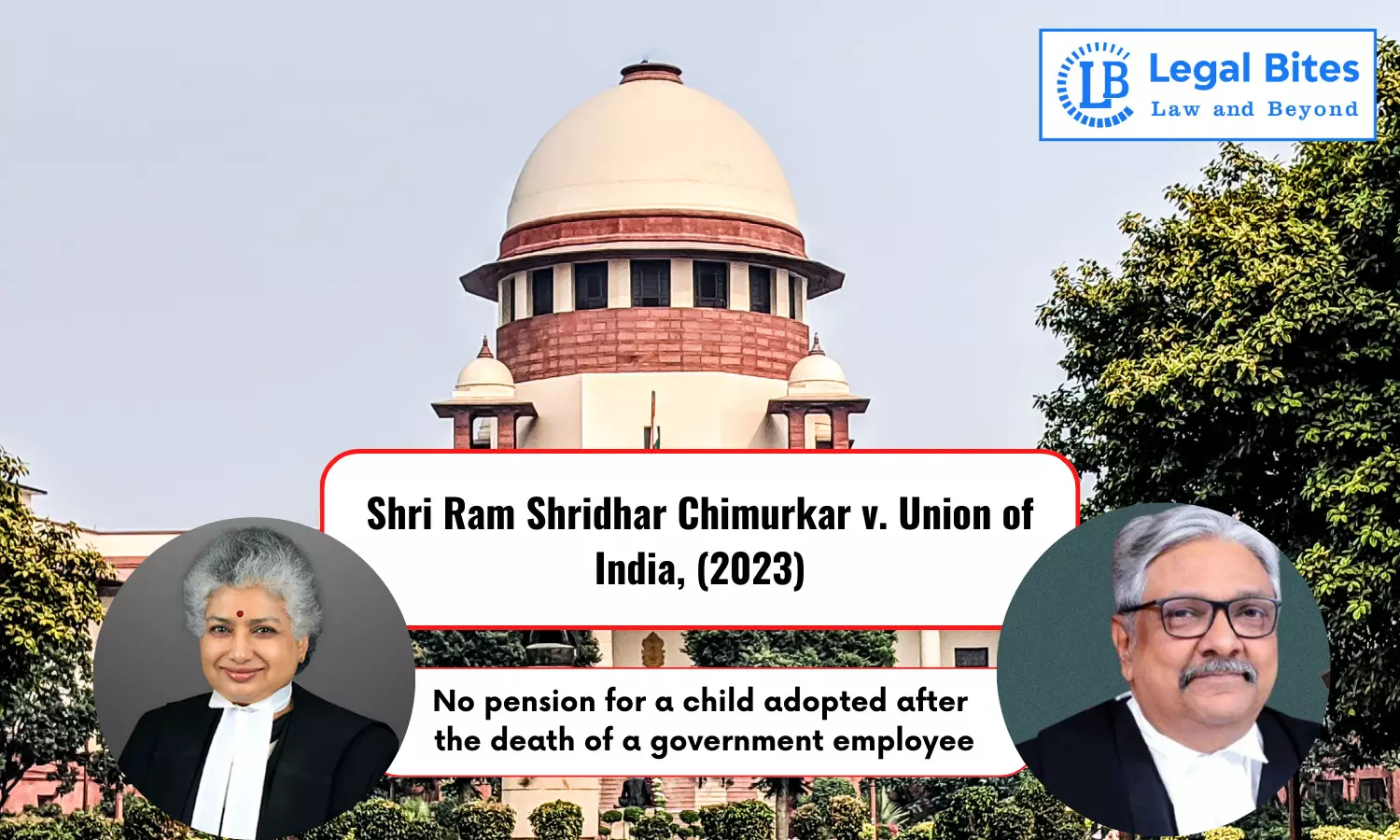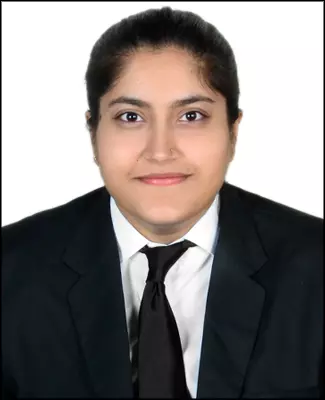Case Analysis: Shri Ram Shridhar Chimurkar v. Union of India, (2023) | No pension for a child adopted after the death of a government employee
The 'Case Analysis: Shri Ram Shridhar Chimurkar v. Union of India, (2023)' pertains to a substantial question of law regarding a child adopted by the widow of a deceased government servant after the death of the government servant.

The 'Case Analysis: Shri Ram Shridhar Chimurkar v. Union of India, (2023)' pertains to a substantial question of law regarding a child adopted by the widow of a deceased government servant, after the death of the government servant. The author has tried to capture the Apex Court’s judgment and encapsulated in this article the pertinent question of who is included within the definition of ‘family’ under Rule 54(14)(b) of the CCS (Pension) Rules.Court: Supreme Court of India...
The 'Case Analysis: Shri Ram Shridhar Chimurkar v. Union of India, (2023)' pertains to a substantial question of law regarding a child adopted by the widow of a deceased government servant, after the death of the government servant. The author has tried to capture the Apex Court’s judgment and encapsulated in this article the pertinent question of who is included within the definition of ‘family’ under Rule 54(14)(b) of the CCS (Pension) Rules.
Court: Supreme Court of India
Citation: Arising out of SLP (C) No.21876 of 2017
Date of Judgement:17th January 2023
Bench: Justice KM Joseph and Justice BV Nagarathna
Facts of the Case
In this instance, Shridar Chimurkar's wife adopted a boy over two years after her husband's passing as a government employee (Sri Ram Shridhar Chimurkar). His request for a family pension was denied on the grounds that, in accordance with Rule 54 (14) (b) of the Central Civil Services (Pension) Rules, children adopted by a widow of a government employee after the employee's death would not be eligible for a family pension. Allowing his application, Central Administrative Tribunal, Mumbai, directed the authorities to consider his claim for a family pension by treating him as the adopted son of the deceased government employee, Shridar Chimurkar.
The Tribunal stated that under Sections 8 and 12 of the Hindu Adoptions and Maintenance Act, 1956 (referred to as the "HAMA Act" for short), a Hindu male widow is qualified to adopt a son or a daughter even if her late husband did not give her a directive or expresses a wish to do so. Therefore, the impact of a widow adopting a kid would be that the child so adopted would be considered to be the child of her late husband, according to the Tribunal. Sri Ram Shridhar Chimurkar petitioned the Supreme Court after the High Court overturned this Tribunal ruling. The court was therefore dealing with a situation where the wife of a retired official of the National Sample Survey Organization had adopted a son in 1996, almost two years after the official's death, who had died issueless.
Issues Involved
- The question put to the Apex Court bench was whether a child adopted by a widow of a government employee after the employee's passing would be included in the definition of "family" under Rule 54 (14) (b) of the CCS (Pension) Rules and would therefore be eligible to receive a family pension paid under said Rules?
Laws Applied
The court emphasised that once a widow adopts a child, the child is assumed to be a part of the widow's late husband's family. However, the provisions of the Hindu Adoptions and Maintenance Act, 1956; Sections 8 and 12 determine the rights of a son adopted by a Hindu widow only vis-à-vis his adoptive family, it said.
In a situation particularly covered by the current pension regulations, an adopted son of a Hindu widow who has rights and entitlements under Hindu law against his adoptive family cannot be deemed to have the same rights and entitlements against the government. The clauses of the HAMA Act, of 1956, which were previously mentioned, are largely related to a Hindu woman's ability to adopt a son or daughter and the consequences of doing so.
The aforementioned clauses are not very helpful in the present case since it concerns the Appellant's rights and entitlements under the CCS (Pension) Rules rather than his rights as an adoptive under Hindu law. The public purse is burdened because there is a significant disparity between an adopted son's rights under Hindu law and his ability to get a family pension.
The court noted that Section 8 of the Hindu Adoption and Maintenance Act of 1956 allows a Hindu woman who is neither a minor nor mentally incapacitated to adopt a son or daughter into her own family with her husband's express approval. However, no such prerequisites apply to Hindu women who are widowed, divorced, or whose husband has either finally abandoned the world after marriage or has been found to be mentally incompetent by a court of competent jurisdiction.
However, it's noteworthy to note that the case at hand also contains questions regarding a child adopted by a Hindu widow's eligibility for family pension payments made to specific types of deceased government employees' legal heirs. Referring to the pertinent Central Civil Services (Pension) Rules, 1972, as modified, is essential. Thus, the Court made it clear that the provisions of the HAMA Act (Hindu Adoption and Maintenance Act) Act, 1956 determine the rights of a son adopted by a Hindu widow only in relation to his adoptive family, and they are not very helpful in the current case because it does not concern the rights of the adoptee, such as the Appellant here, under Hindu Law but rather his rights and entitlements under the CCS (Pension) Rules.
The bench then noted the phrase “in relation to a government servant” as appearing in Rule 54 (14)(b) of the CCS (Pension) Rules. The court observed that a family member must have a close connection to the dead government employee. The phrase "in relation to a government servant" in Rule 54(14)(b) of the CCS (Pension) Rules would mean that the groups of people listed thereunder, such as wife, husband, judicially separated wife or husband, son or unmarried daughter who has not attained the age of twenty-five years, adopted son or daughter, etc. are sought to be brought into association with the deceased government servant.
The context demands that any link or connection between these individuals and the dead public worker be immediate and not indirect. According to the aforementioned Rule, the family member must have had a close relationship with and relied upon the dead public worker throughout his or her lifetime. The term "family" in Rule 54(14)(b) of the CCS (Pension) Rules does not, therefore, include a son or daughter adopted by the widow of a dead government employee after the employee's passing.
The family pension was created to provide support and aid the dependents of the deceased government employee get through their difficult time. The word "family" cannot be expanded to include those who were not even government employees' dependents. As a result, the word "family" cannot be defined to encompass those who were not even the government employee's dependents at the time of his passing. The court also pointed out that cases where a kid is adopted by a widow of a deceased government employee after his death must be contrasted with those where the child is born to the deceased government employee after his death.
Since the former type of heirs would be a posthumous offspring of the deceased government employee, they fall under the concept of family. The rights of such a posthumous kid are quite different from those of a child adopted by the surviving spouse after the death of the government employee. It is easy to understand why this is the case. This is because, unlike a posthumous kid, the deceased government employee would not have been related to the adopted child who would have been adopted after his passing. As a result, when referring to a government employee, the term "family" refers to a variety of people who fall within the "family" terminology, as well as anybody who was related to the employee's family throughout his or her lifetime.
Judgment/Decision
The Supreme Court ruled that a son or daughter adopted by the widow of a deceased government employee after the employee's death cannot be considered a member of the family for purposes of claiming a family pension under Rule 54(14)(b) of the Central Civil Services (Pension) Rules, 1972. The court outlined the concept of "family" under the Central Civil Services (Pension) Rules, 1972, and found that it cannot be broadened to include all heirs as permitted by Hindu law or other personal laws since it is a narrow and precise term. As a result, a son or daughter adopted by the widow of a dead government employee after the employee's passing could not be covered by Rule 54(14)(b) of the CCS (Pension) Rules' concept of "family."
It was also ruled that it is common knowledge that when interpreting a term or idea in legislation, care must be taken to avoid adopting a meaning that has been given to that word or concept in another statute. A different interpretation might result in the family pension provision being abused. As a result, the appeal was rejected by the court.
Important Links
Law Library: Notes and Study Material for LLB, LLM, Judiciary, and Entrance Exams

Vanshika Malhotra
I am a hard-working and motivated law fresher with a firm determination to produce exceptional results, be it individually or in a team. I am currently gaining post-qualification experience in IPR. Along with that, I am also an aspiring NCA candidate.
